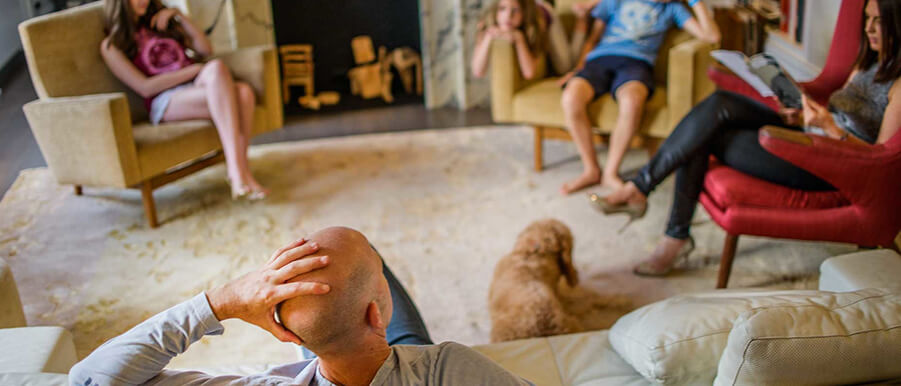 17 Aug 2020
17 Aug 2020
BY: admin
Relationships
Sending Your Kid to College During COVID-19
Sending your kid to college during COVID-19
As parents, it’s natural to worry about your college student when they leave home, especially if this is the first time they’ve ever been on their own. The coronavirus has made it even harder for parents to send their children off to college, and the anxiety can cast a black cloud over what should be a wonderful milestone.
Many colleges have delayed re-openings or have put safety measures in place to reduce the risk of the virus spreading. It would be more concerning as a parent if you weren’t worried about sending your kid to college during COVID. Learning how to manage this anxiety, however, is important to help you be as fully present and supportive as you want to be for your student.
Coping With Coronavirus Anxiety
COVID-19 makes most people nervous, but for many, it has caused paralyzing anxiety. For those with pre-existing conditions, a world with COVID-19 feels like a prison. Your house becomes your only safe space, but it can still be riddled with stress as your loved ones go out and potentially bring the virus back inside.
If everyone practices social distancing, good hygiene and wears a mask, the risk of infection is still extremely low. Your anxiety is normal, but if it’s making it difficult or impossible for you to adjust to the new way of living, professional counseling could help.
Our virtual services range from in-depth psychotherapy to personal counseling. We seek to not only address your concerns but validate them; we accept who you are and what you feel right now, and we want to pass that along to you, so you can begin finding strength in your ability to overcome this difficult time.
College Safety and COVID
Talking to your child about proper safety and prevention can also help dispel some of your own worries. Knowing they are fully aware of the risk and how to protect themselves can give you a small peace of mind.
Discuss the importance of social distancing, always wearing a mask and carrying hand sanitizer at all times. You can also offer them some more practical tips they may not have considered, such as:
- Wearing glasses to avoid eye contamination. Even non-prescription ones can provide a protective barrier.
- Avoiding public bathrooms.
- Reducing possible COVID complications by not smoking, exercising regularly and sleeping well.
- Boosting their immune system with a healthy diet. Smoothies are easy to make and are great alternatives for those who don’t like to eat raw vegetables or fruit.
- Saying no to crowds and get-togethers, especially with people they don’t know.
- Sterilizing phones, light switches, doorknobs and faucets daily.
Counseling to Treat College and COVID Anxiety
We are living through a historical, extremely stressful point in history. You deserve to feel like you have the skills you need to cope with your emotions, whatever they may be. Sending your child to college is emotional enough; you don’t need to struggle through fear and panic alone, too.
Reach out to us today to learn more about our counseling services. We offer flexible, virtual services designed to make professional help as accessible and comfortable as possible.
 17 Jul 2020
17 Jul 2020
BY: admin
Relationships
How to Talk to Your Children About Racism
How to Talk to Your Children About Racism
After the murder of George Floyd and the 2020 Black Lives Matter protests, all of us have reevaluated our own beliefs and become more aware of how deeply racism still impacts people today. Society is changing, and for many, America feels unstable and, as a result, unsafe.
Parents want nothing more than to give their children a peaceful, prosperous upbringing, but that feels difficult now with social justice and political conversations entering every sphere of life.
Talking to your children about racism is important for several reasons; for small children, it helps combat the development of implicit biases many of us grew up with and had to unlearn. For older children, it gives them a safe environment to ask questions, explore their thoughts and be guided toward an educated worldview.
It’s okay not to have all the answers, but that is not a reason to avoid the topic. By addressing racism at home, you can help your children feel understood, be more inclusive and grow up to be people who are able to stand up for equality and combat racial injustice.
When does racism begin?
Babies become aware of physical differences such as skin color as early as 6 months old. By age 5, children begin to show early signs of racial bias and preferences. This can evolve through a number of ways, including subconscious social conditioning in schools and predominant exposure to only one particular race in the media.
Children are far more aware of racism than parents think; it’s a part of society that they are exposed to at an early age. The goal for parents today should be to teach their kids how to combat racism by modeling and promoting inclusivity and celebrating diversity.
Children Under 5
For preschoolers and kindergarteners, it’s important to adapt to their emerging tendency of noticing differences. As they get older and more vocal, toddlers and young children are likely to ask questions or make observations. The old traditional response to this natural curiosity was to chastise or shush children whenever they pointed out a racial difference.
Although parents likely thought this was disapproving of the behavior, it actually creates a negative connotation with racial openness and curiosity. Rather than seeing diversity as something interesting, children receive the message that it is taboo and different equals bad.
You can create a more inclusive environment at home by introducing your child to more diverse toys and media. For example, buy a White, Black and brown baby doll for them to play with. Watch movies and read children’s books that feature Black, Asian and Hispanic main characters. When they ask questions, provide answers and listen to their thoughts. Focus on fairness and sending the message that we are all wonderful and equal no matter what we look like.
Elementary and Middleschoolers
Children in this age group are likely already familiar with the concept of racism. They may already have heard about it from peers, seen it on news or read headlines online. The internet can be a valuable tool, but it can also expose children to biased, sensitive and even graphic material that they are not yet ready to confront. Rather than being able to analyze and decide whether it’s valuable to them, children tend to perceive everything they read online as fact.
Use the web together to explore various media that discuss racism at an appropriate level. BrainPop is an educational platform that offers free resources to promote an antiracist education. Materials are divided by age and cover both historical events and figures such as Harriet Tubman, Jim Crow, Martin Luther King Jr., slavery and the Black Lives Matter movement.
Teens
Teenagers today are impassioned and politically aligned far earlier than their parents and grandparents were. Talk to them about their views, listen to their concerns and find ways to help them be a safe and peaceful activist. You should also tap into their emotions and ask them how they’ve been handling these events and the feelings they stir up. Anxiety, depression, frustration and fear are all normal and natural responses, but they need to be addressed with care.
Educate Yourself First
You may not even know how to start talking about racism because you have your own questions. The subject is so emotionally charged today that many people want to avoid it altogether. There is no perfect answer or cut-and-dry solution for discussing racism at home, but the best conversations come from a position of education and intellectual curiosity.
Start by reading up on the history of racism yourself. Read material by Black and other minority authors. And address your own stress, frustration and anxiety about the state of the world with people you trust. For some, the best source is a licensed therapist who knows how to guide conversations about difficult or challenging topics.
If you would like personal tips on how to talk to your children about racism, or if you need a safe space to confront your own struggles and concerns, we’re here for you. Contact Caring Heart Counseling today by clicking the button below.
 15 Jul 2020
15 Jul 2020
BY: admin
Relationships
Five Fun Family Road Trips from Denver
Five Fun Family Road Trips from Denver
Although the coronavirus has changed the way we travel and enjoy vacations, there are still adventures your family can have that keep everyone safe. To reduce the spread of COVID-19, it’s best to avoid any crowded areas with heavy foot traffic such as hotels and theme parks, even those that are open to the public. Instead, take in some of the gorgeous sights Colorado has to offer by planning a family road trip to some of these breathtaking locations a short drive from Denver.
Yellowstone National Park
The trip from Denver to Yellowstone is approximately 10 hours, making it the longest road trip on this list. If your family has a camper or RV, this is a great time to use it. The kids can unwind, play games and have fun during the ride while you take turns driving and enjoying the scenery unfold around you.
The fastest route to Yellowstone from Denver is via Interstate 25 and Interstate 80. On this trip, you’ll move through the picturesque Rockies and roaming landscapes teeming with nature and wildlife.
Great Sand Dunes National Park
Around 250 south of Denver lies America’s tallest sand dunes. You’ll feel like you’ve been transported to an exotic, faraway land as you gaze upon the dunes. Take a family hike or even go sand sledding; this is an excellent spot to practice safe summer social distancing while still getting to experience something new away from home.
You can cut through Colorado Springs on your journey, which lasts around four hours. If you head out early, this is a great one-day road trip that will have the kids excited all morning and sleeping on the way home.
Rocky Mountains
The Rocky Mountains are one of Colorado’s most beloved natural monuments with numerous hiking trails, scenic routes and wildlife. The Trail Ridge Road is a 48-mile highway that stretches through the mountains and peaks at 12,183 feet. A designated All-American Road, Trail Ridge offers your family ample opportunity to stop and pause to appreciate the view.
The Rocky Mountain National Park driving experience takes your family on an incredible journey surrounded by incredible landscapes and diverse ecosystems.
Glenwood Springs
Driving from Denver to Glenwood Springs will take you through Keystone, Copper Mountain and past the Arapaho and Roosevelt National Forests. The trip spans around two and a half hours, making it ideal for those who enjoy scenic trips but not long car rides. Families with babies or small children will especially benefit from this rewarding but comfortable road trip.
Once you reach Glenwood Springs, you can visit the famous Hanging Lake, which is currently open with social distancing restrictions. The family may simply enjoy taking the trip, singing their favorite songs and basking in the landscapes around them.
Santa Fe
A road trip from Colorado to New Mexico makes an excellent weekend getaway. The adventure features plenty of scenery, wildlife and beautiful canyons that illustrate the diversity of both states. The distance from Denver to Santa Ve is around six hours and features plenty of small towns, museums and historical sights in between.
When planning your family road trips, make sure that you plot an itinerary and check the current restrictions for every destination. Getting out in the sunshine is important even during the coronavirus, and road trips offer a safe way to travel that puts nature right in front of you.
 27 Apr 2020
27 Apr 2020
BY: admin
Relationships / Virtual Counseling
Relationship Counseling During COVID-19
Relationship Counseling During COVID-19
Quarantine and COVID-19 pose unique challenges to couples; some may be finding it difficult to maintain personal boundaries and healthy communication as they quarantine together while others are feeling detached and disconnected due to social isolation. Relationships are not exempt from the added stress of coping with the coronavirus, but partners do not have to simply hope for the best and ignore their problems.
Relationship counseling online can bridge the distance of social isolation and connect couples with licensed therapists who can help them work through any challenges they’re experiencing.
How Relationships Are Impacted by the Coronavirus
Dating requires consistency, communication and a healthy dose of independence on both sides. Couples currently find themselves either separated by mandatory shelter-in-place orders or confined together in their living quarters with limited outside social contacts.
For even the closest couples, quarantining together can be difficult. Constantly being around one another can lead to more arguing, and the flare-up of mental health symptoms many are experiencing may put further strain on a relationship.
Some partners may feel helpless as their significant other’s anxiety and/or depression symptoms worsen. Others might not be sure how to express their desire for personal space without being offensive. There may be limited opportunity to separate and cool off before resolving arguments. Others may feel like their relationship is stagnating without the ability to go out and do things together.
On the other end of the spectrum, COVID-19 has led to social isolation that has many couples separated. Those in long-distance relationships may feel especially distraught as they have no definitive date when they can see one another again.
The stress of managing a relationship and life during the coronavirus makes online counseling and relationship therapy a beneficial tool to anyone who finds themselves struggling during this time.
What Relationship Counseling Can Do Today
No therapist has all the answers, and couples might even feel like they’re at a loss for help with physical offices closed. But online counseling for couples can be just as effective as in-person sessions. Couples can speak together or individually to a counselor about what they’re going through and work on developing solutions.
Online counseling provides the opportunity for couples to express thoughts and feelings they may not be able to articulate with their partner during regular conversation. A counselor knows how to ask questions that facilitate constructive dialogue and foster understanding.
Together, couples and individual partners can work with a counselor to learn how to support each other through COVID-19 and protect their relationship. To speak with a therapist or request an appointment, click here.
 24 Aug 2018
24 Aug 2018
BY: admin
Counselor Blog / Relationships
The Truth About Relationships #1
Relationships can be great… plain and simple. I truly believe this! Our culture tends to have two extreme and opposing messages about romantic relationships. First, that they should be REALLY EASY. The Disney ideal! If I have to work to keep my relationship alive, then there must be something wrong, because if this is “true love,” or “the one,” it should be fairly effortless!
The second and opposing message is that relationships are HARD WORK! Get ready for it! If you are going to be in a lasting relationship with someone, it is going to be a grueling drudgery! …But what if there is a third way to look at partnership? Yes, relationships require work. We all know that!
What if the work is fruitful and even fun… meaning it is challenging and rewarding and gives us a sense that we can make good things happen?
(I find myself wondering if anything in life is ever truly easy. Even when we have everything we need, we humans seem to have the capacity to find the difficulty in things. It’s our curse, I think, and our destiny. Suffering and discomfort lead to growth… like it or not!)
Likewise, what if there are some alternative truths about relationships? What if we are transformed by our relationships? Maybe, when we are rubbing up against our partners, challenging them and pissing them off, the relationship is doing exactly what it was meant to do… to transform us and shape us into our truest, biggest, and sharpest selves? Leading sociological and relationship researcher, John Gottman, notes that there are, on average, 10 areas of “incompatibility” in couple relationships. These “incompatibilities” are not the problem! As it turns out, relationship satisfaction rests on HOW these areas are dealt with and engaged in.
This is good news! It is not the relationship challenges themselves that are problematic, but how we go about dealing with these challenges that really matters. And, if we have good information and use it… good outcomes tend to follow!
Tip: Turn toward each other in your differences. Show intense interest in these areas of uniqueness. Is there something for you to learn? Can your partner influence you in some way in this area? Maybe this is part of your growth and transformation as an individual.
Look for a continuing series on relationships over the next year. You might be surprised by what you read and might find yourself hopeful, once again, for the relationship you have chosen. You did choose it, you know! Keep choosing it, if it is safe, and tune in for the next installment…
For more information about relationships and relationship counseling, give us a call at 303-429-5099.
 15 Aug 2018
15 Aug 2018
BY: admin
Counselor Blog / Relationships
The Truth About Relationships #2: Solvable vs Perpetual Problems
70% of the problems couples face in their relationships are actually not solvable! Wrap your mind around that for a second… or maybe two… You mean my partner and I keep trying to solve unsolvable problems??? YES!
John Gottman discovered this in his sociological research in the 90’s. One of the great skills in creating the relationship you most deeply desire is the ability to differentiate between the relationship issues that are solvable and the ones that aren’t. Why is this so important? Because it can change the way we approach the issues we come up against in our relationships.
Here’s what Gottman and others have discovered… Solvable problems allow for a clear compromise; a win-win situation is readily visible.
Problem: “I like creamy peanut butter and you like crunchy peanut butter”
Solution: “Let’s buy both!”
Problem: “I want to hike a fourteener and you want to do yoga”
Solution: “You hike a fourteener and I’ll do yoga!”
Problem: “I want things clean and you want things neat.”
Solution: “I will spearhead clean and you can spearhead neat!”
Many other problems are perpetual issues across the lifespan of the relationship. You know you’re dealing with a perpetual issue when you see it coming up again and again (duh!). This is because they are so strongly tied to the individuals’ personal makeup (intrinsic drives & motivations, innate tendencies & preferences, and deeply held values).
“I need more physical touch than you.”
“I’m a verbal processor and you’re an internal processor.”
“My environment affects me so strongly, but you seem unaffected by it.”
“I’m a planner and you’re spontaneous.”
“I’m a risk-taker and you are risk-avoidant.”
“I respond emotionally and you respond logically.”
“I want to deal with conflict right now and you need space.”
I could go on and on with examples. But you can see and feel the difference can’t you? Perpetual issues aren’t resolved by simple compromise. A clear win-win is not readily apparent. And this drives couples crazy! “What’s wrong with you? You should be more like me!” Of course, we forget that the things that drive us nuts now, are the very things that first attracted us to each other! What begins as, “He’s just so easy-going and never seems to get riled up,” becomes, “How can he be so calm? I just want to shake him!” “She’s so passionate and fun,” becomes, “She’s such an emotional mess!”
Listen. As hard as you try, perpetual issues are not actually solvable. And that’s okay. And if they are ever going to be solved, it will be the result of healthy engagement around the issue. Until then, your job is to turn toward each other in these perpetual issues. Reach for understanding. Have multiple conversations. Regularly advocate for the relationship dynamic you desire. Be the change you wish to see in your relationship.
A personal example: Betsy and I have been married for 20 years. At the beginning, I desired much more physical affection than she. This has complex origins, but basically has its roots in our childhood family dynamics. This became a perpetual issue for us. I regularly reached out for physical touch more than Betsy. I regularly requested that Betsy reach out more. I understood that her lower felt need in this area was not a personal attack on me or lack of interest in or attraction to me, but simply a way of relating that was more familiar in her. She graciously worked to increase her contact initiation with me.
Over time, we have come much more center with each other. I will always reach out more often to make physical contact, but my need for it is less intense. And Betsy has really skyrocketed in her felt need for physical contact, and will reach out very often to make those brief points of contact. Amazing. But to get there, we had to dialogue, get curious and mine into each other, reach for understanding, step away from personalizing the issue, advocate for and communicate what we were wanting, and realize that it didn’t really matter who reached out more for contact – only that contact was made and responded to. And Betsy did an amazing job of responding to my reaching out for connection.
So, as Gottman suggests… turn toward each other in these perpetual issues. It will pay off.
For more information about relationships and relationship counseling, give us a call at 303-429-5099.
 31 Jul 2018
31 Jul 2018
BY: admin
Couple Counselling / Relationships
The Truth About Relationships #3: Appreciation
The number one factor in satisfying relationships is appreciation. I know. It sounds too simple. If you think about it, though, every one of us knows how good it can feel to be appreciated! When we were children, we loved to be noticed for who we were and what we did. If you have children, it’s true for them, too. And it’s true for you and me today. Appreciation tells us that we are noticed and that we have something of value to offer others.
But appreciation is, seemingly, not easy. Somehow, we are uncomfortable with it. We resist giving it and receiving it. Why? Several reasons come to mind. Perhaps it feels somehow exposing. Maybe it feels like a set-up for disappointment or failure. Or does our thinking go something like this?… “No need to say thank you, it’s my job.” Or, “Why should I be appreciated for what I should be doing anyway?” Or more contemptuous, “So now you want praise for just being an adult and doing what needs to be done? Grow up!” These are all things I’ve heard from couples when talking about the desire to be appreciated.
We are missing the point. Just because we do something out of necessity or responsibility does not mean that we can’t appreciate a person’s willingness and action! I love it when Betsy says, “Thanks for packing the kids’ lunch’s,” or, “Thanks for vacuuming, for making the beds, for putting the kids’ down, for making dinner, for doing the dishes, for working so hard to make money for our family, for taking a risk tonight going out with new neighbors, or for…” The possibilities are endless!
If you were a fly on the wall in my house, you would probably think we were ridiculous. Over time, appreciation has just become a regular part of our daily interaction. It’s motivating and pleasant, and creates a positive energy that is deeply satisfying; that often “cuts through the sludge” when any one of us is less than excited to do some task that needs to be taken care of (which is also a daily occurrence in our family!).
John Gottman researched what he termed the 5:1 ratio. Five compliments to every one criticism. The 5:1 ratio has been shown, across time, to be predictive of satisfying relationships. Less than the 5:1 ratio and you are in trouble in your relationship (statistically). It’s kind of common sense, isn’t it? But we forget.
What works against the 5:1 ratio? The human brain! The human brain, it seems, is wired to pay attention to the negative – that which is not working, that which needs fixing or improving, that which needs changing, that which is missing, and/or that which is not pleasing. It’s survival, I suppose. But relationships don’t thrive when we are in survival mode. And in our daily lives, we don’t generally need to be operating out of survival mode.
So, why not give something different a try? Why not try highlighting that which IS working? That’s called APPRECIATION! In some ways, it’s simply positive reinforcement. It works with children. It works with dogs. And it works for you and me! Simple? Yes. Easy? Yes and No. The simple truth, though, is that it works. And your relationship is worth it.
If you are struggling with creating a culture of appreciation in your relationship, or if you are having relationship challenges of any kind, one of our therapists can help. Give us a call at 303-393-0085 or visit us on the web at www.foundationsfamilycounseling.com and we can help you take the first step to improving your relationship.
For more information about relationships and relationship counseling, give us a call at 303-429-5099.
- 1
- 2

